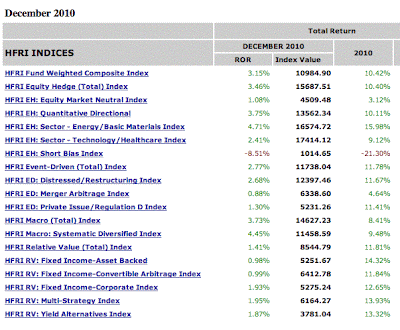UBS and HFR have launched an ETF that tracks the
HFRX Global Hedge Fund Index.
Prices are available on Yahoo. These seem to indicate that it costs E50k per share?! The press release below says it targets "
qualified investors". Maybe this is through the choice of the high price? Apparently the ETF is invested as a
swap. They mention further listings to come. I'll be waiting with interest.
December 17, 2010 (Chicago & Zurich) – UBS AG and Hedge Fund Research (HFR) have launched the UBS ETFs plc - HFRX Global Hedge Fund Index SF, the first Exchange-Traded Fund (ETF) built on the industry’s most widely used standard investable benchmark of hedge fund performance globally, it was announced today.
The UBS ETFs plc - HFRX Global Hedge Fund Index SF-I was listed on the Deutsche Boerse Exchange on 3 December 2010 (symbol UIQG). The “SF-I” share class is targeting qualified investors. UBS and HFR anticipate additional listings in coming weeks. The ETF is UCITS III compliant.
With performance dating back to 1998, the HFRX Global Hedge Fund Index is the industry standard for investible hedge fund indices, offering investors access to the benefits of passive indexation in the hedge fund industry. The benefits are achieved through consistent fund selection, leveraging HFR’s industry standard database and classification structure to calibrate strategy weighting and optimize individual fund weightings.
One of the world’s leading financial firms, UBS is headquartered in Zurich and Basle, Switzerland. UBS serves a discerning and international client base with its wealth management, investment banking and asset management businesses. UBS is present in all major financial centers and has offices in over 50 countries. UBS employs more than 64,000 people around the world.
HFR is headquartered in Chicago and is the industry leader in the areas of aggregation, indexation and analysis of the hedge fund industry. The partnership for the ETF leverages the core strengths of both firms.
"We are delighted to bring the UBS plc ETF-HFRX Global Hedge Fund Index to the market. This is a unique opportunity for investors to access the world-leading hedge fund benchmark in a liquid, exchange traded, UCITS compliant form," said Nicolas Samaran, Executive Director in the Fund Derivatives Structuring Group at UBS AG.
“The UBS –ETFs plc - HFRX Global Hedge Fund Index SF represents the first in a new generation of hedge fund index ETFs, offering investors the ability to gain passive exposure to hedge fund performance in a transparent, liquid, and UCITS III compliant manner” said Kenneth J. Heinz, President of HFR. “The construction and versatility of the ETF enables it to be used broadly by both institutional & retail investors to obtain hedge fund exposure efficiently.”

















































